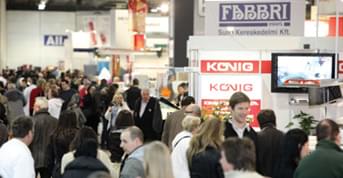After the big day out
Hungexpo organised FOODAPEST and UKBA together on 5-8 February. Despite the cold weather more than 11,500 people visited the event, where nearly 200 exhibitors showcased their products and services on 7,000m². In his opening speech, deputy secretary of state of the Ministry of Rural Development Dr Lajos Bognár emphasised that the time of poor quality food products came to an end.
The government’s measures intend to speed up the process of consumers turning to quality Hungarian products. On Sunday the Hungarian round of the SIAL d’Or 2012 international product competition was held. Monday morning another 22 Hungarian product manufacturers earned the right to use the Quality Product from Hungary marking. The 9 new honoured enterprises were: Nagykun 2000 Zrt., Kunság-Szesz Zrt., Clearwater Kft., Pápai Hús 1913 Kft., PICK Szeged Zrt., Kométa 99 Zrt., Fino-Food Kft., Nádudvari Élelmiszer Kft. and Hiksz Kft. Trade magazin and Hungexpo organised four roundtable discussions at FOODAPEST. On Monday the topic was changes in taxation and legal requirements. The discussion was moderated by Ottília Dörnyei (GfK Hungária) and from Dr Judit Firniksz (PricewaterhouseCoopers) we learned that domestic companies are struggling to meet constantly changing legal requirements. Dr Béla Fischer (ÉFOSZ) told that the biggest problem is not recession but that policymakers do not consult professional organisations. Zoltán Fekete (Brand Association) was of the opinion that companies in the sector are often preoccupied with each other’s mistakes instead of fighting the common enemy: the black market. Dr Lajos Bognár (Ministry of Rural Development) told that the ministry intends to help the food industry in technological development and in fighting black trade. György Vámos (OKSZ) suggested the establishing of a ‘hotline’, an informal communication channel between the industry, retail and state authorities that would help in waging war against black trade. Private label and import food products were the topic of the roundtable discussion Tuesday morning. The moderator was Dr Géza László, (franchise owner of Product of the Year in Hungary), who told about one of the world’s largest consumer-voted awards for product innovation that the pre-selection period was completed, and winning products would be announced at a gala on 29 March 2012. Dr Andrea Bajkai (Tesco Hungary) informed participants about their regional suppliers’ forum and how it helps SMEs to become local, regional or nationwide suppliers. Alpok-Aqua, Kuntej and Weinhaus Kft. were the success stories from the SME sector that she mentioned. Vito Catale (Latinum Zrt.) spoke about their import strategy and how they export Italian products from Hungary to our eastern neighbours. Tuesday afternoon the roundtable discussion was moderated by Endre Fazekas (SIÓ-ECKES). Before participants analysed the export opportunities of domestic food products, they have known the Paprika Gourmet’s first deli store, which opened in Barcelona, and that another three delis are about to open in Germany. In the discussion phase we heard from participants Dr András Köves (Casa Azucar), Ágota Hódi (Hódi Paprika Kft.), Zoltán Soós (Soós Pasta), László Egyed (Fino-Food Kft.) and Zsolt Pálinkás (Tesco Hungary) that it is a misunderstanding that Hungarian food products are well-known and liked abroad. Unique products have a place in international delicatessen shops but other products from SMEs need ‘trading houses’ – companies that would help them in accessing foreign markets and staying there. There was a roundtable discussion on Wednesday too, where moderator Levente Almási (PricewaterhouseCoopers) told that last year the domestic merger and acquisition market was only ‘saved’ by the government-funded JEREMIE capital investment programme. Teréz Torjákné Amberger (GVH) spoke of the division of powers between the competition authorities of the European Union and member states. Dr Péter Sükösd (GVH) surveyed the aspects of dealing with actual cases, telling that they have to take into consideration both suppliers’ and end users’ interests. Zoltán Gyaraky (Ministry of Rural Development) represented the government’s ‘special’ position of protecting the diversity of the supply chain. Kornél Saltzer (Spar Hungary) told that more and more frequently they are struggling to find enough Hungarian-made quality products for promotions. Alongside Hungarian businesses enterprises from 11 foreign countries took part in the trade fair, the three biggest stands came from Germany (more precisely Bavaria), Italy and Belgium. BORésPIAC magazine set up their WINEisland this year as well, where visitors had the chance to taste almost 50 types of wines and champagnes. Future Store was one of the biggest spectacles: Trade magazin and Trade Marketing Club built their store for the second time, collecting products, services and advertising tools that are already available but are only expected to conquer the Hungarian market in a few years time. As for UKBA, this year the Hungarian Baker Association – with an ambitious new president, András Kurdi – came better prepared and organised than ever before. Not only did their bread-themed decoration attract visitors but the programmes as well. The negotiating tables were always occupied and the presentations focused on finding the solutions for the most urgent problems of the bakery sector. Secretary general József Werli told us that in innovation the main direction is the making of artisan products, using ingredients that are in line with the health trend and reaching back to traditions. He also urged bakers to sell product through their own shops. One of the Baker Association’s latest ‘projects’ is the Bread of the Nation competition, the idea of which emerged in Romania and was realised in cooperation with the Gastropan association. There were 32 entries but because of the bad weather only 20 made it to the jury table. An international jury – which included Boldizsár Ilonka (vice president of UIB) – decided that Péter Irimiás’ Kopppány Golden Bread was the best. Backer bakery from Komárno wan the special prize of visitors. Mr Werli was really happy that in confectioners’ decoration work competition students’ works were almost as good as adults’. He added that on the last day students from eight vocational schools competed in brioche making and each team baked at least 40 types of products – the team from II. Béla Secondary and Vocational School from Pécsvárad won the competition. János Pataki, president of the Guild of Hungarian Confectioners informed us that they substituted the cancelled regional leg of the Confectioner World Championship with other exciting programmes. All of these tried to contribute to the renewal of the profession with some kind of new impulse – without which customers are unlikely to return to confectioneries. On the first day of UKBA the results of the Confectionery Product Competition were announced. Mr Pataki told that this time much more sophisticated products entered the competition than two years ago. One of the biggest talents and confectioner of the year in 2011, János Kovács (Karamell-világ, Kecskemét) won in the overall category.
Related news
Related news
Technological advancements and business travel
The latest research from International Workplace Group (IWG), the leading…
Read more >K&H: a gift, but what and from which store?
When it comes to Christmas gift-giving, clothes are the most…
Read more >Eckes-Granini acquires fruit juice concentrate producer in Germany
Eckes-Granini, one of Europe’s leading juice producers, has acquired Wolfgang…
Read more >






